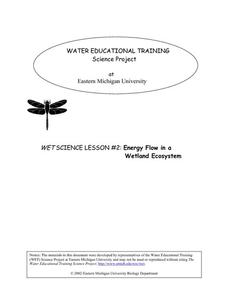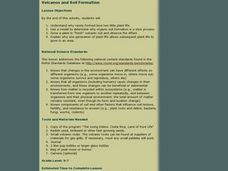Curated OER
Web of Life Game: Trout
Students explore the concept of food webs. In this food web lesson, students demonstarte the connection between species. Students use a ball of string show how the food web works, then have a class discussion.
Curated OER
Aquatic Food Webs
Middle schoolers discuss producers, herbivores, omnivores, carnivores, and decomposers and analyze the difference between food chains and food webs. They participate in a food web yarn game, examining what can effect the breakdown of the...
Curated OER
Food Web
Middle schoolers are able to define food web, and identify the interdependence of organisms within a system. They are able to describe how natural events and human activities can impact a food web.
Curated OER
The Frog and the Ol' Black Fly
Students explore frogs. In this cross curriculum literacy and frogs lesson plan, students predict the plot and then listen to the book The Wide-Mouthed Frog by Keith Faulkner. Students define "predator" and identify foods a frog might...
Curated OER
Food Chains
Fourth graders study food chains, producers, consumers, and decomposers. They play a food chain game and create food chain mobiles or posters. They take a nature hike around the school and observe various parts of a food chain.
Curated OER
The Web Of Life - Overlapping Food Chains
Learners perform an activity in which they discover what happens when food chains overlap in an ecosystem and discover the three components of a food web.
Curated OER
Frogs: Fact or Folklore
Middle schoolers discover how frogs are adapted to their environment. They view and discuss a Discovery Channel video on frogs and the myths surrounding frogs. In small, groups they compile data on frogs from the internet to create a...
Eastern Michigan University
Energy Flow in a Wetland Ecosystem
How is energy transferred within an ecosystem? What would happen to a food web if one of the organisms was removed? Elementary or middle school ecologists examine these questions and more in a comprehensive 5E learning cycle lesson....
Curated OER
The Web of Life - Ecosystem
Students examine the concepts of ecosystems and interdependence. They construct block pyramids to demonstrate interdependence, and map off an area to observe and identify animals. They create food chain mobiles and play a web of life game.
Curated OER
Six Levels of Ecological Organization
Ninth graders describe the six levels of ecological organizations and give examples of each. They also differentiate between food chains and webs and identify trophic and consumer levels in food chain and food webs.
Curated OER
Pond Ecology
A lab activity is a great way to incite thoughtful questioning and scientific processes. Pupils will collect organisms with a Petri dish, make observations, sketch the organism, ask questions, then attempt to identify the specimen...
Curated OER
Why So Many Frogs?
Students explain the different stages in the growth of a frog, then analyze and collect data to make generalizations about a larger population. They determine the survival rate of a population of tadpoles under controlled conditions.
Curated OER
Predator and Prey Game
Students explore the why the balance among producers, predators and prey is necessary in order for an ecosystem to be sustained over time. Through web games and activities, they discover how each component of the food chain works to...
Curated OER
Life Cycles
Using computers, Students work in small groups and progress through the roles of Explorer, Researcher, Designer, and Evaluator as they study the life cycle of plants, insects, butterflies and frogs.
WK Kellogg Biological Station
Sounds of Selection
Do you want a creative and fun way to teach about natural selection? Hop to it by turning your middle school princes and princesses into frogs trying to catch as many bugs as possible in a Hungry Hungry Hippos style game. For high...
Curated OER
Froggy Fun
Students exploring about frogs and their environment. They describe what camouflage is and why it is useful to frogs especially in the environment that frogs live in. They also draw a picture of a frog in its habitat.
Curated OER
Life Processes
Students investigate the basic needs of organisms that must be met in order to carry out life processes. They view a variety of organism that are meeting and competing for resources. Students create an Idea Web for the animals shown....
Curated OER
Water, Water Everywhere (Pond Animals)
Second graders examine the characteristics of animals who live in a pond environment. In groups, they describe the various stages in the life of a frog and identify the characteristics of other pond animals. Using this information,...
Curated OER
Happy Habitats
Students explore different habitats. In this habitat lesson, students investigate four different habitats through participating in a WebQuest. Students create an animal web using Kidspiration or a video documentary upon completing the...
Curated OER
Energy for Animals
First graders discover how animals depend on other animals for energy. They identify sources of energy in their daily life and describes the actions of nightime and daytime animals. They list sources of food and shelter for specific...
Curated OER
Aquatic Science
What a terrific way to explore the pond habitat! Learners discuss the animal and plant life found in the Long Island area. They also discuss vocabulary terms, identify pollution concerns, and resource conservation.
Alliance Theater
The Jungle Book Post-Show STEAM Lesson
An ecosystem is really just the flow of energy through many different living organisms. A study of Rudyard Kipling's The Jungle Book leads to an environmental science activity in which learners study how various factors can affect...
Curated OER
Animals Active at Night
Students identify animals that are active at night and the reasons why. They examine the features needed to be a nocturnal animal. They create a representation of one of the animals.
Curated OER
Wilderness
High schoolers examine the dynamic between animals and humans in the wilderness. They work together in groups share their journal entries when asked to reflect on natural areas.

























